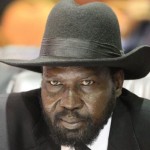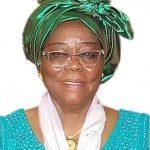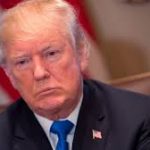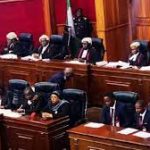OPINION: Fixing the Nigeria Political Upheavals
African News, Articles/Opinion, Latest Headlines, News Across Nigeria, Politics Wednesday, September 13th, 2017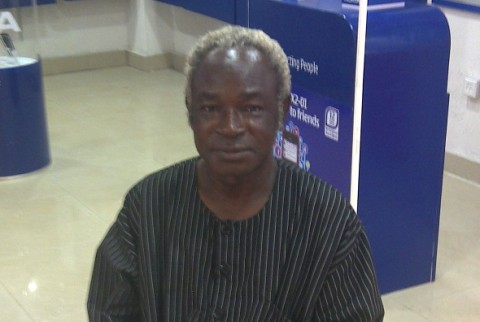
Photo: Prof. R. A. Ipinyomi
By Prof. R. A. Ipinyomi, University of Ilorin, Nigeria
(AFRICAN EXAMINER) – The ramifications of Nigeria political upheavals and its instabilities are acutely being felt by Nigerian children and outsiders living in Nigeria, much more than their grandparents that caused the confusion. Nigerian children, who will now be grappling with the meaning of Nigeria or the world, seem to have been unfortunately born by people who were also born in a place called Nigeria. So these children are Nigerians and governed by people who conquered governments with gun barrels, stole from government treasuries, and now being celebrated as presidents, governors, ministers, senators, etc. They build castles and live like kings of the medieval eras, but they also surely know that they are common criminals, fraudsters and thieves. This may be why they build tall walls around themselves and move around in the company of many armies of bodyguards in bulletproof vans. Their lifestyles, the multiple problems they have caused, or their falsehoods are not our focus here but how to exit from such political vicious cycles to a meaning system our children can be proud of. The society’s major fault is its high level of tolerance to societal evil; they tolerate stealing, failures, ineptitude and nepotism. Now they have been told that their complaints could be regarded as hate speech. Hence they have to keep tolerating the systems they know are evil and wrong.
It must also be recalled that after colonial system ended, with all unsettled rubbles in Nigeria, the people in the three main regions agreed to work toward a united Nigeria that could not war against itself but would provide a platform for development. On October 1, 1960 precisely, we were school pupils holding Nigeria flags in our hands. However by July of 1966 the centre could no longer hold and the centre fell apart. Again, our objective is not the remembrance of history, those who died, and those who took over, and so on. But if we fail to know the source of our national chaos, and where we took the wrong path that is leading to nowhere, we may also fail in the analysis. The first set of mistakes happened when old politicians gave wrong advice to very young unprepared military officials to take over government affairs. At age 25 years or thereabout, unprepared and unschooled (in the arts of politics) young military officials became decision makers for a multi-ethnic, multi-religion, and a complex society like under developed Nigeria. Those children military politicians fought each other based on “position-fixing-game” because military seniority was not to be used to assign political posts but ethnic and religious preferences. Then the two major consequences happened; the broken-down of genuine economic regional development and the breaking-out of a major civil war. Today every one of the actors had written stories to favour their respective parts and not necessarily on what really happened. These are the sort of self written biographies and history books in the stores.
What are we actually talking about when on Nigeria Politics? What is Nigeria? Why should anyone fix her problems or pay any attention? Well, as so much else, we might say, it began in large part before 1960. The country was organized as Eastern Region, Lagos Colony (like Abuja Federal Capital of today), Northern Region and the Western Region. The agitation for independence had started long ago by the people in the Lagos Colony, like Herbert Macaulay, and that ignited the Federal House also holding in Lagos. The agitation had all the undertones which were political, economic and social inequalities. The gaps between the earnings of the average head of a business and the salary of the average worker in that business varied by colour, region and by federal. The white worker could earn 40 times the black worker, the regions were earning better than the federal workers, in addition the regions were earning differently from each other.
When the army came in, through a coup in 1966, the regional economic powers were removed; institutions were taken over especially mission schools and private businesses. The regions were paid from the centre instead of allowing them to generate their own incomes and paying taxes to the federal. It was an economic model that was neither from the capitalist nor from the socialist policy. We have been suspecting all along that those politicians, (and many of them are still hanging around in government corridor of power), would have simply turned the Central Bank of Nigeria to a mere Minting House. This is because if Nigeria had been able to spend only what it generated the value of the national currency would have been very stable and firm. If people had been encouraged to live on their efforts and incomes the working culture also would have been very encouraging. Today the people in the national assemble seemingly earn about 2000 times the minimum approved monthly wage. The system had been encouraging taking arms to seize power, going out to steal rather than to work, poor presence of government in any community. Thieves and kidnappers could not be arrested because many of them could have been government officials or agents with connections to high government people.
What is Nigeria’s economic model? After the Nigeria civil war in 1970 the military government rolled out “Udoji Commission” simply for wage increase and wage unification and no emphasis on productivity. The economic could absorb the suck because of the incoming income from the new oil fields. The Nigeria system not only favoured the rich and powerful but grew false contractors who were fronting for government officials. Hence the entire economy fell through the cracks leading to what was later termed over valued national currency. Then IBB took over the rest through a devaluation system whose negative consequences hardly received any academic or political attention. Austerity took over as well as serial structural adjustment programmes. Nigeria government was incapable to create Lagos or Kano as a center of world financial capital, but they moved Nigeria monies to foreign accounts. Everyone is to note that the world is looking for a new financial capital. Recall that when President Obama’s administration cracked down on some abuses by New York Wall Street
Participants, the world capital of finance moved to London as the new corruption centre. With the coming Brexit, we envisage that the world finance will be looking for a new capital and may move back to New York because of a Donald Trump. May be South Africa may be ready as the next save haven for corruption.
What would matter to us is how to fix Nigeria political and economic jam-lock. Politicians are currently investing their energies on how to take advantage of their pronounced religion, regional and ethnicity whereas the focus should be on human organization and policies for empowerment of the people. The political parties have no sustaining structures and politicians are just floating around from one party to another. The Independent National Electoral Commission, (INEC) is still living very far “Below the Snake-line” and far away from the electorate in some Abuja air-conditional office. They are yet to understand their job; the INEC institution needs to be independent politically and economically. Similarly government economic policy, through legislation and practice is still zero. Only a very few sectors like the Dangote group of companies are visible, whereas the economy is yearning for hundreds of the Dangotes and in a competitive way. What each politician is allegedly spending, as campaign funds, could actually create for the same politician a viable investment for their life time. The politics must move from money wasting and egoism to the reality ground where sustainable development is of more priority.
It is no longer out of point if one is projecting African politics into the 21
st century and beyond even whilst African politicians, led by Nigerians, would prefer to continue living in the medieval African kingdoms, and living as lords of the jungle. Hence politicians have to wake up into the awareness of the technological sophistication prevailing in our common global village. Let us illustrate just in two or three simple areas that most people can easily conceive, without being security experts. First any of our internet accounts, like facebook or emails, are not beyond what some 100 level university students can hack. Therefore if African politicians have high taste for foreign technologies in their lives such politicians are dangers to domestic national security. Security meetings that such individuals attend and all their discussions can be tapped. Secondly, the advancement in microchip technology has also made it possible for individuals to insert such chips under their skins or anywhere in the body so that such individuals can be monitored. The technology has been in use in “Captured and Recaptured Surveys” ; surveys of rare animals. African politicians exposing their body to foreign hospitals risk being monitored throughout the rest of their sensitive tenure and hence put domestic national security into further risks. We guess that African politicians would not want to hear this fact that the more they patronize foreign hospitals, foreign technologies, and sophisticated gadgets, the more they put pressure on their own personal security and their own nations. The solution is for them to grow their domestic economics and technologies. Hence restructuring the mindset should be the first priority.
Prof. R. A. Ipinyomi
Related Posts
Short URL: https://www.africanexaminer.com/?p=40758


